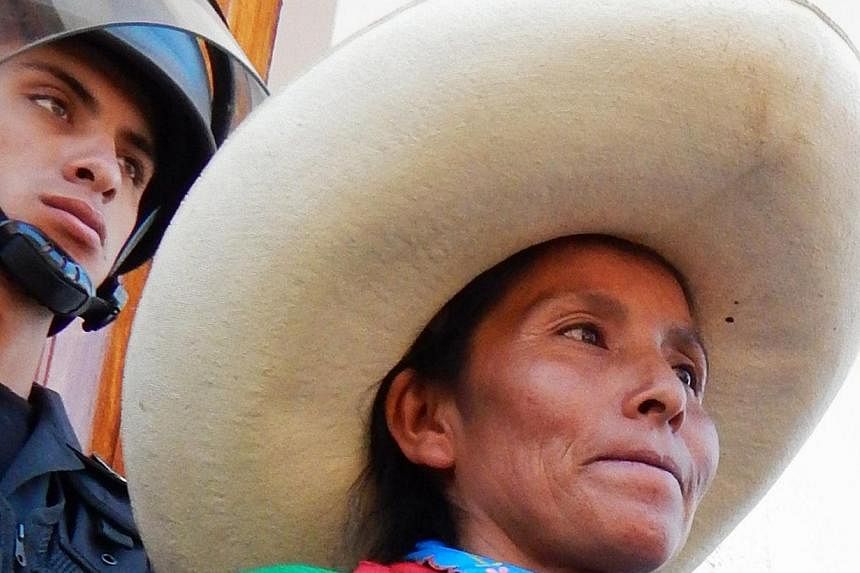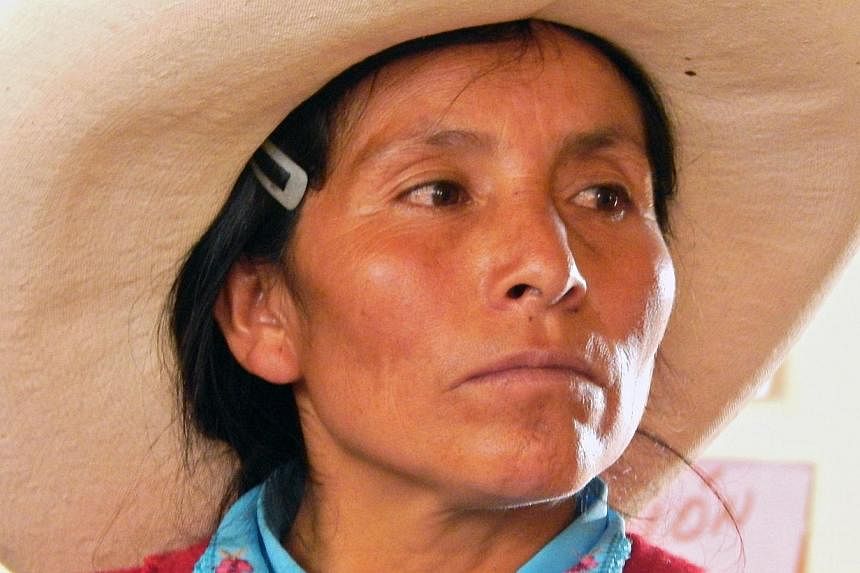LIMA (AFP) - With her straw hat and peasant dress, Maxima does not look like the type to take on a global mining giant, but as she gazes out from her small house in the Peruvian highlands she is adamant: this is her land.
Maxima Acuna de Chaupe lives with her husband, four children and son- and daughter-in-law on a small farm that sits on the land where Yanacocha, a subsidiary of US mining giant Newmont, wants to expand South America's largest open-pit gold mine.
The firm is facing widespread opposition to the US$4.8-billion gold- and copper-mining project from the local community and the regional government of Cajamarca in northern Peru, which says the mine expansion will put the water supply at risk.
Maxima, 48, has become the face of that resistance.
For four years the illiterate peasant farmer has been fighting the mining company in a court battle that took a dramatic turn last week when she tried to build an addition on her house and Yanacocha tore it down.
"I can show that we have owned this land since 1994. All my papers are in order," Maxima said.
"What counts here are documents. Let them show their documents! If they're the owners, let them present the bill of sale, the document with my signature that says I sold this land," said Maxima, an indigenous woman with a chiseled face who wears bright traditional clothing and the wide-brimmed straw hat that is customary in the region.
Maxima's farm is a 25-hectare (60-acre) plot at an altitude of nearly 4,000 meters (13,000 feet) in the hamlet of Tragadeogrande.
Yanacocha claims it bought the land in 1996 from the local department of Sorochuco.
It pressed charges against her for invasion of property, but Maxima was acquitted.
Her lawyer, Mirtha Vasquez of environmental defense group Grufides, says the matter should have ended there.
But when the family tried to expand its small house, Yanacocha workers demolished the cement addition, with the help of the police, according to Maxima.
"They want to make me leave by force. They see that I'm poor, that I don't know how to read and they think I can't stand up for my rights. But I have my documents. I've got no reason to be humiliated or afraid," she said by telephone.
With her lawyer's help, Maxima has now brought charges of her own against Yanacocha for invasion of property.
Since 2011, the mining company has had to suspend prospecting in the region over concerns about the environmental impact of its plans to drain the area's high-altitude lagoons and replace them with artificial reservoirs.
Those plans have only strengthened Maxima's resolve.
"My land borders Yanacocha. It has springs... which we drink from. If I sell it, what water am I going to drink? What will we live off of?" she said.
She accuses the mining firm of blocking the access roads to her land and preventing her family from going out for food.
But she is not intimidated.
"My family has suffered for defending this land, but I just want to leave my children a place where they can live," she said.
Her fight has brought new attention to the conflicts between Peru's indigenous communities and mining companies that extract the country's natural resources, its main source of wealth.
According to the government mediator for such cases, 140 environmental conflicts were registered last month alone.
This week a 25-year-old villager died in clashes between police and protesters fighting oil company operations in the Amazon.
The protest in the central village of Pichanaki came on the second day of a strike targeting oil operations that local people fear will contaminate rivers and soil.
After the clashes, which also left 20 people wounded, the government ordered the oil company, Argentine firm Pluspetrol, to withdraw from the area.
But such disputes present a dilemma for the government, which is keen to revive mining investment after it fell more than 10 per cent last year - a drop that mining firms blame on environmental regulations that delay their projects.


